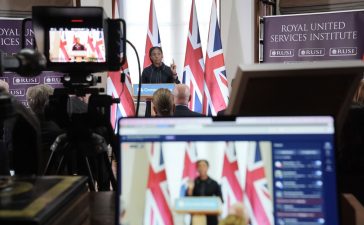 Reuters
ReutersTuesday has become the hottest day of the year so far as a heatwave continues to affect large parts of the UK.
Met Office measuring stations in both Heathrow and Kew Gardens, south-west London, reached 32C (90F) earlier – exceeding the 31.9C recorded in the centre of the city on 19 July.
London, southern England and south-eastern Wales are expected to meet the official criteria for a heatwave this week.
But the hot weather may be short-lived – with a yellow alert for thunderstorms issued by the Met Office across large parts of both nations later in the week.
A Yellow Heat Health Alert has been issued for all areas of England – except for the North East and North West – by the UK Health Security Agency (UKHSA).
This is the second of four tiers of alerts – below amber and red – and means the heat is “unlikely to impact most people” but could affect the elderly and vulnerable.
The UKHSA has warned the hot spell may make an “observed increase in mortality across the population likely, particularly in the 65-plus age group or those with health conditions, but impacts may also be seen in younger age groups”.
 Jordan Pettitt/PA Wire
Jordan Pettitt/PA WireIt also warns that there will likely be an increase in the demand for remote health care services, and that internal temperatures in hospitals and care homes may become too hot for clinical risk assessments to take place.
Many parts of the country will experience temperatures four-to-five degrees warmer than average for this time in July, BBC Weather said.
Wales has also seen its warmest day of the year so far, with 29C recorded in Usk, near Newport.
Scotland and Northern Ireland have not seen record-setting temperatures though, with highs of 22.3C and 23C on Tuesday respectively.
Is this a heatwave?
The Met Office defines a heatwave in the UK as “when a location records a period of at least three consecutive days with daily maximum temperatures meeting or exceeding the heatwave temperature threshold.”
For London and the surrounding region, that threshold is 28C – which has been surpassed since Monday. Temperatures are expected to remain above that level through to Friday.
In south-east England the threshold is 27C, dropping to 26C for other parts of southern England and the Midlands.
Becky Mitchell, a Met Office meteorologist, told the BBC that, given the current forecast, much of the southern UK was “entering a heatwave” – even though that heatwave has not technically been recorded yet.
She said that in the coming days, central and southern England, as well as south-east Wales, are expected to have heatwaves officially declared.
For Scotland, Northern Ireland, Wales and most of northern and western England, the heatwave threshold is 25C.
If nowhere in Scotland reaches 25C on Tuesday, it will be the first July since 2010 that temperatures there have not reached this level.
 Met Office
Met OfficeScientists say that climate change makes hotter days more likely and more intense.
Heatwaves are also becoming longer in many places, including in the UK.
BBC Weather lead forecaster Chris Fawkes said: “After such a hot day the heat will be very slow to fall away, giving an uncomfortable night for sleeping with temperatures still above the 20C mark in many towns and cities.”
He added that Wednesday would be another hot day: “It could turn out to be a hotter day in parts of central southern England and parts of the Midlands with temperatures peaking around 31C to 32C.
“In the south-east of England temperatures are more likely to be a few degrees lower, but still reaching about 29C.”
A yellow thunderstorm warning comes into force across south-east England and parts of the south coast from 12:00 BST to 23:59 on Wednesday.
The drier weather for the rest of England is expected to break on Thursday, when another yellow thunderstorm warning takes effect.
That one begins at 12:00 BST on Thursday and ends at 23:59.
Most of northern and southern England, the Midlands, and parts of Wales are covered by Thursday’s alert, which warns of “lightning, hail and gusty winds” that could lead to some disruption.
Warm weather is due to return by Friday – below heatwave criteria but still about 20C in many areas – with some rain showers.
The rest of the month is expected to bring breezy conditions to the north west, and drier and brighter weather to the south east.
A more widely settled period is expected towards the middle of August.
Additional reporting by Aleks Phillips












